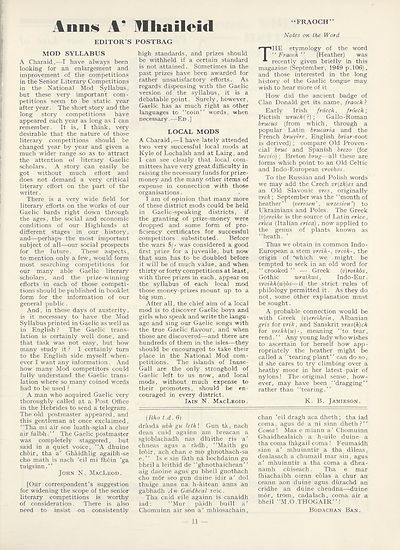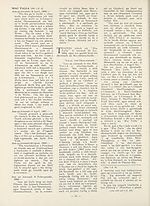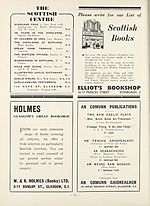An Comunn Gàidhealach Publications > Gaidheal > Volumes 44--45, January 1949--December 1950
(299) Page 11
Download files
Complete book:
Individual page:
Thumbnail gallery: Grid view | List view

“FRAOCH’
Aniiw A* ^lliailcid
EDITOR S POSTBAG
MOD SYLLABUS
A Charaid,—I have always been
looking for an enlargement and
improvement of the competitions
in the Senior Literary Competitions
in the National Mod Syllabus,
but these very important com¬
petitions seem to be static year
after year. The short story and the
long story competitions have
appeared each year as long as I can
remember. It is, I think, very
desirable that the nature of those
literary competitions should be
changed year by year and given a
much wider range so as to attract
the attention of literary Gaelic
scholars. A story can easily be
got without much effort and
does not demand a very critical
literary effort on the part of the
writer.
There is a very wide field for
literary efforts on the works of our
Gaelic bards right down through
the ages, the social and economic
conditions of our Highlands at
different stages in our history,
and—perhaps the most important
subject of all—our social prospects
for the future. These aspects,
to mention only a few, would form
most searching competitions for
our many able Gaelic literary
scholars, and the prize-winning
efforts in each of those competi¬
tions should be published in booklet
form for the information of our
general public.
And, in these days of austerity,
is it necessary to have the Mod
Syllabus printed in Gaelic as well as
in English ? The Gaelic trans¬
lation is certainly well done, and
that task was not easy, but how
many study it ? I certainly turn
to the English side myself when¬
ever I want any information . And
how many Mod competitors could
fully understand the Gaelic trans¬
lation where so many coined words
had to be used ?
A man who acquired Gaelic very
thoroughly called at a Post Office
in the Hebrides to send a telegram.
The old postmaster appeared, and
this gentleman at once exclaimed,
"Tha mi air son luath-sgial a chur
air falbh. ’ ’ The Gaelic postmaster
was completely staggered, but
said in a quiet voice, "A dhuine
chbir, tha a’ Ghaidhlig agaibh-se
cho math is nach ’eil mi fhein 'ga
tuigsinn.”
John N. MacLeod.
[Our correspondent’s suggestion
for widening the scope of the senior
literary competitions is worthy
of consideration. There is also
need to insist on consistently
high standards, and prizes should
be withheld if a certain standard
is not attained. Sometimes in the
past prizes have been awarded for
rather unsatisfactory efforts. As
regards dispensing with the Gaelic
version of the syllabus, it is a
debatable point. Surely, however,
Gaelic has as much right as other
languages to “coin” words, when
necessary.—Ed .]
LOCAL MODS
A Charaid,—I have lately attended
two very successful local mods at
Kyle of Lochalsh and at Lairg, and
I can see clearly that local com¬
mittees have very great difficulty in
raising the necessary funds for prize-
money and the many other items of
expense in connection with those
organisations.
I am of opinion that many more
of these district mods could be held
in Gaelic-speaking districts, if
the granting of prize-money were
dropped and some form of pro¬
ficiency certificates for successful
competitors substituted. Before
the wars 5/- was considered a good
first prize for a juvenile, but now
that sum has to be doubled before
it will be of much value, and when
thirty or forty competitions at least,
with three prizes in each, appear on
the syllabus of each local mod
those money-prizes mount up to a
big sum.
After all, the chief aim of a local
mod is to discover Gaelic boys and
girls who speak and write the langu¬
age and sing our Gaelic songs with
the true Gaelic flavour, and when
those are discovered—-and there are
hundreds of them in the isles—they
should be encouraged to take their
place in the National Mod com¬
petitions. The islands of Innse-
Gall are the only stronghold of
Gaelic left to us now, and local
mods, without much expense to
their promoters, should be en¬
couraged in every district.
Iain N. MacLeoid .
(Bho t.d. 6)
drasda ubh gu leth ! Gun ta, nach
dean cuid againn am breacan a
sgioblachadh nas dluithe ris a’
chneas agus a rkdh, “Maith gu
leoir, ach chan e mo ghnothach-sa
e.” Is e sin feith na bochdainn gu
bheil a leithid de “ghnothaichean”
aig daoine agus gu bheil gnothach
cho m6r seo gun duine idir a’ dol
thuige anns na h-aitean anns an
gabhadh An Gaidheal reic.
Tha cuid eile againn is canaidh
iad: “Mur pkidh buill a’
Chomuinn air son a’ mhiosachain.
Notes on the Word
THE etymology of the word
' ‘ Fraoch ’ ’ (Heather) was
recently given briefly in this
magazine (September, 1949 p. 106),
and those interested in the long
history of the Gaelic tongue may
wish to hear more of it
How did the ancient badge of
Clan Donald get its name, fraoch ?
Early Irish frdech, frdech;
Pictish wruch( ?); Gallo-Roman
brucus (from which, through a
popular Latin brucaria and the
French bruyire, English briar-root
is derived) ; compare Old Proven-
cial bruc and Spanish brezo (for
brecio); Breton brug—all these are
forms which point to an Old Celtic
and Indo-European vroikos.
To the Russian and Polish words
we may add the Czech vr(zh)es and
an Old Slavonic vres, originally
vrek ; September was the ‘ ‘month of
heather” (veresen’, wrzesien’) to
Ukrainians and Poles. The Greek
(v)ereike is the source of Latin erice,
erica (Italian erica), now applied to
the genus of plants known as
“heath.
Thus we obtain in common Indo-
European a stem vreik-, vroik-, the
origin of 'which we might be
tempted to seek in an old word for
“crooked” — Greek (v)roikds,
Gothic wraikws, Indo-Eur.
vroikh[w)6s—if the strict rules of
philology permitted it. As they do
not, some other explanation must
be sought.
A probable connection would be
with Greek (v)ereik.ein, Albanian
gris for vrik, and Sanskrit vras(h)ch
for vrekk(w)-, meaning “to tear,
rend. ’ ’ Any young lady who wishes
to ascertain for herself how app¬
ropriately the heather might be
called a "tearing plant” can do so,,
if she cares to try climbing over a
heathy moor in her latest pair of
nylons! The original sense, how¬
ever, may have been “dragging”
rather than “tearing.”
K. B. Jamieson.
chan ’eil dragh aca dheth; tha iad
coma, agus d6 a ni sinn dheth?”
Coma\ Mas e miann a’ Chomuinn
Ghaidhealaich a h-uile duine a
tha coma fhagail coma! Feumaidh
sinn a’ mhuinntir a tha dlleas,
dealasach a chumail mar sin, agus
a’ mhuinntir a tha coma a dhea-
namh ciiiseach. Tha e mar
fhiachaibh oirnn eolas a chur an
ceann aon duine agus diirachd an
cridhe an duine cheudna—duine
m6r, trom, cadalach, coma air a
bheil “M.O.THOGAIR” !
Bodachan Ban.
- 11
Aniiw A* ^lliailcid
EDITOR S POSTBAG
MOD SYLLABUS
A Charaid,—I have always been
looking for an enlargement and
improvement of the competitions
in the Senior Literary Competitions
in the National Mod Syllabus,
but these very important com¬
petitions seem to be static year
after year. The short story and the
long story competitions have
appeared each year as long as I can
remember. It is, I think, very
desirable that the nature of those
literary competitions should be
changed year by year and given a
much wider range so as to attract
the attention of literary Gaelic
scholars. A story can easily be
got without much effort and
does not demand a very critical
literary effort on the part of the
writer.
There is a very wide field for
literary efforts on the works of our
Gaelic bards right down through
the ages, the social and economic
conditions of our Highlands at
different stages in our history,
and—perhaps the most important
subject of all—our social prospects
for the future. These aspects,
to mention only a few, would form
most searching competitions for
our many able Gaelic literary
scholars, and the prize-winning
efforts in each of those competi¬
tions should be published in booklet
form for the information of our
general public.
And, in these days of austerity,
is it necessary to have the Mod
Syllabus printed in Gaelic as well as
in English ? The Gaelic trans¬
lation is certainly well done, and
that task was not easy, but how
many study it ? I certainly turn
to the English side myself when¬
ever I want any information . And
how many Mod competitors could
fully understand the Gaelic trans¬
lation where so many coined words
had to be used ?
A man who acquired Gaelic very
thoroughly called at a Post Office
in the Hebrides to send a telegram.
The old postmaster appeared, and
this gentleman at once exclaimed,
"Tha mi air son luath-sgial a chur
air falbh. ’ ’ The Gaelic postmaster
was completely staggered, but
said in a quiet voice, "A dhuine
chbir, tha a’ Ghaidhlig agaibh-se
cho math is nach ’eil mi fhein 'ga
tuigsinn.”
John N. MacLeod.
[Our correspondent’s suggestion
for widening the scope of the senior
literary competitions is worthy
of consideration. There is also
need to insist on consistently
high standards, and prizes should
be withheld if a certain standard
is not attained. Sometimes in the
past prizes have been awarded for
rather unsatisfactory efforts. As
regards dispensing with the Gaelic
version of the syllabus, it is a
debatable point. Surely, however,
Gaelic has as much right as other
languages to “coin” words, when
necessary.—Ed .]
LOCAL MODS
A Charaid,—I have lately attended
two very successful local mods at
Kyle of Lochalsh and at Lairg, and
I can see clearly that local com¬
mittees have very great difficulty in
raising the necessary funds for prize-
money and the many other items of
expense in connection with those
organisations.
I am of opinion that many more
of these district mods could be held
in Gaelic-speaking districts, if
the granting of prize-money were
dropped and some form of pro¬
ficiency certificates for successful
competitors substituted. Before
the wars 5/- was considered a good
first prize for a juvenile, but now
that sum has to be doubled before
it will be of much value, and when
thirty or forty competitions at least,
with three prizes in each, appear on
the syllabus of each local mod
those money-prizes mount up to a
big sum.
After all, the chief aim of a local
mod is to discover Gaelic boys and
girls who speak and write the langu¬
age and sing our Gaelic songs with
the true Gaelic flavour, and when
those are discovered—-and there are
hundreds of them in the isles—they
should be encouraged to take their
place in the National Mod com¬
petitions. The islands of Innse-
Gall are the only stronghold of
Gaelic left to us now, and local
mods, without much expense to
their promoters, should be en¬
couraged in every district.
Iain N. MacLeoid .
(Bho t.d. 6)
drasda ubh gu leth ! Gun ta, nach
dean cuid againn am breacan a
sgioblachadh nas dluithe ris a’
chneas agus a rkdh, “Maith gu
leoir, ach chan e mo ghnothach-sa
e.” Is e sin feith na bochdainn gu
bheil a leithid de “ghnothaichean”
aig daoine agus gu bheil gnothach
cho m6r seo gun duine idir a’ dol
thuige anns na h-aitean anns an
gabhadh An Gaidheal reic.
Tha cuid eile againn is canaidh
iad: “Mur pkidh buill a’
Chomuinn air son a’ mhiosachain.
Notes on the Word
THE etymology of the word
' ‘ Fraoch ’ ’ (Heather) was
recently given briefly in this
magazine (September, 1949 p. 106),
and those interested in the long
history of the Gaelic tongue may
wish to hear more of it
How did the ancient badge of
Clan Donald get its name, fraoch ?
Early Irish frdech, frdech;
Pictish wruch( ?); Gallo-Roman
brucus (from which, through a
popular Latin brucaria and the
French bruyire, English briar-root
is derived) ; compare Old Proven-
cial bruc and Spanish brezo (for
brecio); Breton brug—all these are
forms which point to an Old Celtic
and Indo-European vroikos.
To the Russian and Polish words
we may add the Czech vr(zh)es and
an Old Slavonic vres, originally
vrek ; September was the ‘ ‘month of
heather” (veresen’, wrzesien’) to
Ukrainians and Poles. The Greek
(v)ereike is the source of Latin erice,
erica (Italian erica), now applied to
the genus of plants known as
“heath.
Thus we obtain in common Indo-
European a stem vreik-, vroik-, the
origin of 'which we might be
tempted to seek in an old word for
“crooked” — Greek (v)roikds,
Gothic wraikws, Indo-Eur.
vroikh[w)6s—if the strict rules of
philology permitted it. As they do
not, some other explanation must
be sought.
A probable connection would be
with Greek (v)ereik.ein, Albanian
gris for vrik, and Sanskrit vras(h)ch
for vrekk(w)-, meaning “to tear,
rend. ’ ’ Any young lady who wishes
to ascertain for herself how app¬
ropriately the heather might be
called a "tearing plant” can do so,,
if she cares to try climbing over a
heathy moor in her latest pair of
nylons! The original sense, how¬
ever, may have been “dragging”
rather than “tearing.”
K. B. Jamieson.
chan ’eil dragh aca dheth; tha iad
coma, agus d6 a ni sinn dheth?”
Coma\ Mas e miann a’ Chomuinn
Ghaidhealaich a h-uile duine a
tha coma fhagail coma! Feumaidh
sinn a’ mhuinntir a tha dlleas,
dealasach a chumail mar sin, agus
a’ mhuinntir a tha coma a dhea-
namh ciiiseach. Tha e mar
fhiachaibh oirnn eolas a chur an
ceann aon duine agus diirachd an
cridhe an duine cheudna—duine
m6r, trom, cadalach, coma air a
bheil “M.O.THOGAIR” !
Bodachan Ban.
- 11
Set display mode to:
![]() Universal Viewer |
Universal Viewer | ![]() Mirador |
Large image | Transcription
Mirador |
Large image | Transcription
| An Comunn Gàidhealach > An Comunn Gàidhealach Publications > Gaidheal > Volumes 44--45, January 1949--December 1950 > (299) Page 11 |
|---|
| Permanent URL | https://digital.nls.uk/127125624 |
|---|
| Description | This contains items published by An Comunn, which are not specifically Mòd-related. It includes journals, annual reports and corporate documents, policy statements, educational resources and published plays and literature. It is arranged alphabetically by title. |
|---|
| Description | A collection of over 400 items published by An Comunn Gàidhealach, the organisation which promotes Gaelic language and culture and organises the Royal National Mòd. Dating from 1891 up to the present day, the collection includes journals and newspapers, annual reports, educational materials, national Mòd programmes, published Mòd literature and music. |
|---|---|
| Additional NLS resources: |
|

